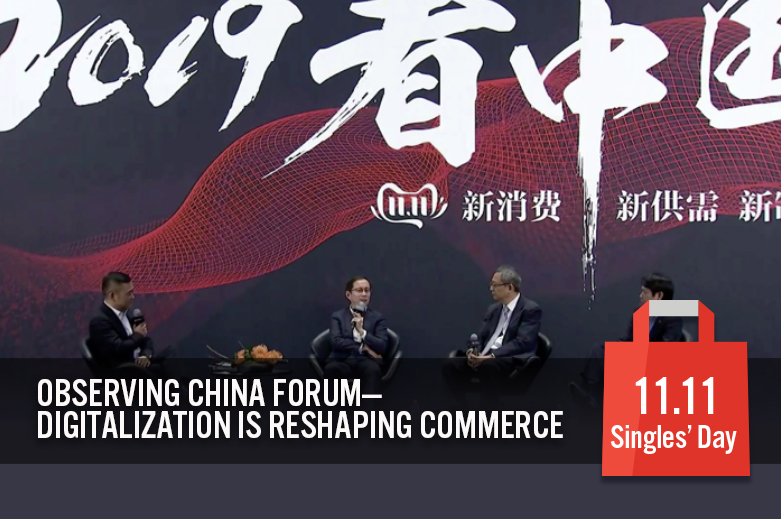
albert Chan
Hot on the heels of another record-breaking Singles’ Day on November 11, 2019, the Coresight Research team attended the Observing China Forum in Beijing on November 14. The forum was organized by AliResearch (the research arm of the Alibaba Group) and the Guanghua School of Management of Peking University and focused how digitalization is reshaping commerce in China.
These are our key insights from the forum:
Retailers Need To Shift to a Consumer-Centric Mindset
KPMG Partner Mao Jian noted that most retailers rely on previous experience to make decisions when it comes to making and promoting products, but in the digital era, retailers need to shift to a “consumer-centric” mindset, using data insights to inform business strategies.
One example is Nestlé’s “reversed C2B” (consumer-to-business) model through which consumer preferences influence product development and marketing. For example, the company used to promote its Nescafe Gold Blend Instant Coffee by emphasizing the product’s simplicity and convenience. When data showed that a growing number of consumers in China value fitness and low-sugar diets, Nestlé changed its marketing campaign to highlight the low-calorie, low-sugar aspects of the product and its health benefits. Nescafe Gold Blend Instant Coffee remains one of the top-selling products on Nestlé’s Tmall store.
Digitalization Is Bringing Retailers Closer to Their Consumers
Conflicting objectives among the high number of parties involved in China’s supply chains often result in operational inefficiencies, hampering manufactures’ and brands’ ability to meet consumer demand quickly enough. Digitalization offers a solution to this problem: By sharing information in digital form among all parties, changes can be made more quickly and suppliers can respond more quickly to requests from buyers.
For example, fast-food restaurant chain KFC is digitalizing its business in China, with a focus on the consumer-facing front end of the supply chain. Its first step was to team up with Alipay—Alibaba’s third-party mobile and online payment platform—in 2015 to offer customers an alternative way to pay that they found interesting and convenient. When KFC noticed that customers often had to wait for long periods of time during peak breakfast hours, the company launched an “order online, pick up in store” service. According to the company, this move supported the growth of its loyalty program, which now has 200 million members in China. Users can order online, pick up in store or have their meal delivered—even to a seat on a train. Through digitalization, KFC is also creating new ways to engage with customers. For example, at select KFC restaurants, users can use a function within the KFC app to choose songs to be played at the restaurant.
Retailers Need To Continually Innovate for the China Market
Consumers in China have more choice now than ever before. To keep ahead, retailers need to keep inventing new products to attract and retain customers. For example, L’Oréal is “going deep” to understand what consumers really want and then creating different portfolios specifically for the China market.
KFC came up with an innovative approach to promoting itself on Singles’ Day. While other retailers can sell products in large quantities during the shopping holiday, KFC found a way to benefit outside the one-day sales period. The brandteamed up with Tmall to launch a pre-paid gift card and discount coupons specifically for the shopping holiday—consumers who bought coupons on Singles’ Day can redeem them at KFC restaurants to take advantage of lower prices.
The Future of Single’s Day
The current, exponential gross merchandise volume (GMV) growth rates during annual Singles’ Day will gradually drop to single digits, so retailers cannot count on continued growth in shopping holiday sales volumes and need to watch changes in consumption. For example, growth in service consumption is being partly driven by consumer trends around health and sustainability, which may inform future consumer preferences.
Alibaba Group CEO Zhang Yong told forum attendees that Singles’ Day is a shopping event for “all consumers” and involves almost all retailers, both online and offline. As brick-and-mortar stores increasingly tap into e-commerce, Zhang agreed that the key to ensuring Singles’ Day longevity is innovation.